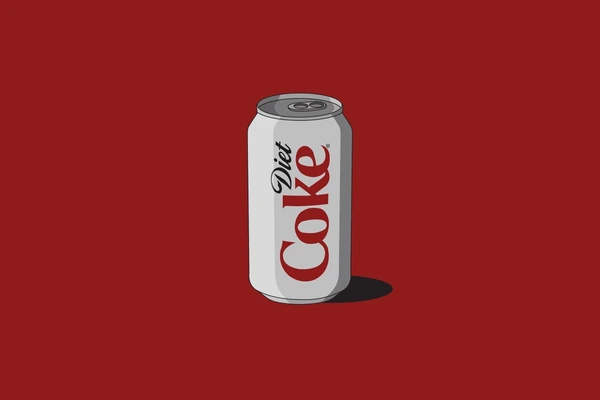
Diet Coke has become a staple for those seeking a low-calorie, sugar-free alternative to regular soda. It has garnered a loyal following worldwide with a wide array of flavors and a promise of no added sugars. However, questions about its health implications continue to stir debate. In this comprehensive guide, we will delve into the world of Diet Coke can, examining its ingredients, flavors, caffeine content, and potential health risks. By the end, you’ll understand whether this popular beverage is a safe choice for you.
Table of Contents
The Popularity of Diet Coke
Diet Coke, often considered the healthier sibling of the classic Coca-Cola, was introduced in 1982 and quickly gained popularity. Its appeal lies in its ability to offer a similar taste to regular Coke without the added calories and sugars. Over the years, it has been marketed heavily towards individuals looking to maintain or lose weight, as well as those with conditions like diabetes that necessitate reduced sugar intake. The introduction of various packaging options, including the classic Diet Coke can, mini Diet Coke cans, and Diet Coke bottle, has further cemented its place in the market.
What is Diet Coke?

Diet Coke is a sugar-free, low-calorie soft drink produced and distributed by the Coca-Cola Company. Launched in 1982, it quickly became a favorite for those looking to reduce their calorie and sugar intake without sacrificing flavor. Unlike its regular counterpart, Diet Coke uses artificial sweeteners such as aspartame and acesulfame potassium to achieve its signature taste without the added sugars. It caters to diverse preferences and is available in various packaging options, including the classic Diet Coke can, diet coke mini cans, and even Diet Coke glass bottles.
Ingredients in Diet Coke
Diet Coke contains carbonated water, caramel color, aspartame, phosphoric acid, potassium benzoate, natural flavors, and citric acid. Although it’s a popular choice, it’s essential to understand these ingredients and their effects on health.
- Carbonated Water: This is water infused with carbon dioxide gas under pressure, creating the bubbles that give soda its fizz.
- Caramel Color: This ingredient gives Diet Coke its characteristic color. It is made by heating sugar in the presence of acids, alkalis, or salts.
- Aspartame: A low-calorie sweetener that is approximately 200 times sweeter than sugar. It is used to provide a sweet taste without the calories.
- Phosphoric Acid: This ingredient adds acidity to the drink, enhancing its flavor. It is also used as a preservative.
- Potassium Benzoate: A preservative that helps extend the product’s shelf life.
- Natural Flavors: These proprietary blends give Diet Coke its unique taste.
- Citric Acid: Adds a tart flavor and acts as a preservative.
What Makes Diet Coke Different?
Unlike regular Coca-Cola, which uses high-fructose corn syrup or sugar, Diet Coke uses artificial sweeteners to achieve its sweetness. This makes it a popular choice for those looking to reduce their sugar intake. However, it also means Diet Coke does not provide the same nutritional value as other beverages like milk or 100% fruit juice.
Does Coke Have Caffeine?

Caffeine is a common component in many sodas, and Diet Coke is no exception. A standard diet Coke can (12 fl oz) contains about 46 mg of caffeine. In comparison, a can of Coke Zero has approximately 34 mg of caffeine. These levels are significantly lower than the caffeine content in a typical cup of coffee, ranging from 95 to 200 mg per serving. Caffeine is included not just for its stimulating effects but also because it contributes to the overall flavor profile of the drink.
Which Has More Caffeine, Coke Zero or Diet Coke?
When it comes to caffeine content, Diet Coke has slightly more than Coke Zero. A 12 fl oz Diet Coke contains about 46 mg of caffeine, while the same serving of Coke Zero contains approximately 34 mg. This relatively minor difference might influence your choice depending on your sensitivity to caffeine.
For those looking for a stronger caffeine kick, Diet Coke can might be the better option. However, Coke Zero could be a more suitable choice for individuals who are more sensitive to caffeine or looking to reduce their intake. It’s important to balance your caffeine consumption throughout the day, considering all sources, including coffee, tea, and other caffeinated beverages.
Comparing Caffeine Content
| Beverage | Caffeine Content (mg) |
| Diet Coke (12 fl oz) | 46 |
| Coke Zero (12 fl oz) | 34 |
| Regular Coke (12 fl oz) | 34 |
| Coffee (8 fl oz) | 95-200 |
The Role of Caffeine in Diet Coke
Caffeine in Diet Coke serves multiple purposes. It enhances the flavor, making it more appealing to consumers who enjoy the slight bitterness it adds. Additionally, caffeine is a mild stimulant, providing a temporary boost in energy and alertness, which can be particularly appealing in a midday drink.
Diet Coke Can Flavours and Nutritional Value

Diet Coke comes in a variety of flavors to suit different tastes. Some popular options include:
- Classic Diet Coke
- Diet Coke Caffeine-Free
- Diet Coke with Lime
- Diet Coke with Splenda
- Diet Coke Cherry
Each flavor has a slightly different ingredient list to achieve its unique taste profile. For instance, Diet Coke with Lime includes lime flavoring, while Diet Coke Cherry includes cherry flavoring.
Nutrition Table of Comparison of All Flavors
| Flavor | Calories | Caffeine (mg) | Sodium (mg) | Sweeteners |
| Classic Diet Coke | 0 | 46 | 40 | Aspartame |
| Diet Coke Caffeine-Free | 0 | 0 | 40 | Aspartame, Acesulfame K |
| Diet Coke with Lime | 0 | 46 | 40 | Aspartame, Acesulfame K |
| Diet Coke with Splenda | 0 | 46 | 40 | Sucralose, Acesulfame K |
| Diet Coke Cherry | 0 | 46 | 40 | Aspartame, Acesulfame K |
Is Diet Coke Bad For Your Health?
Numerous studies and debates have examined the health implications of consuming Diet Coke. Here, we will explore some potential risks associated with This consumption.
Potential Risks
- Weight Gain and Obesity: Despite being calorie-free, some studies suggest that artificial sweeteners in Diet Coke may contribute to weight gain by increasing appetite and altering gut microbiota. Research indicates that artificial sweeteners might interfere with the body’s ability to regulate calorie intake, leading to overeating and weight gain.
- Diabetes and Heart Disease: Regular consumption of diet sodas has been linked to an increased risk of metabolic syndrome, type 2 diabetes, and cardiovascular diseases. Some studies suggest that artificial sweeteners can disrupt the body’s metabolic processes, potentially leading to insulin resistance and increased blood sugar levels.
- Kidney Health: Diet Coke’s high phosphorus content may lead to chronic kidney disease. Phosphoric acid can increase the acidity of urine, potentially leading to kidney damage over time. Studies have shown that people who consume large amounts of diet soda have a higher risk of developing kidney disease.
- Bone Density: The phosphoric acid in Diet Coke can interfere with calcium absorption, potentially leading to decreased bone density and osteoporosis. This is particularly concerning for women, who are at higher risk of osteoporosis as they age.
- Tooth Erosion: Diet Coke’s acidic nature can erode tooth enamel over time, increasing the risk of dental issues. Combining acids and artificial sweeteners can make teeth more susceptible to decay and cavities.
Observational Studies
Most of Diet Coke’s negative health impacts come from observational studies, which show correlations but not causations. Therefore, while the data suggest potential risks, direct experimental research is needed to draw concrete conclusions. It’s important to consider that individuals who consume large amounts of diet soda might also have other lifestyle factors that contribute to these health issues.
Industry-Funded Research
It’s also worth noting that the beverage industry funds some research on diet sodas. These studies often report more favorable outcomes, suggesting that diet sodas do not have significant negative health effects. However, the potential bias in these studies means that independent, high-quality research is necessary to provide more definitive answers.
Can Diet Coke Cause Cancer?

The relationship between Diet Coke and cancer primarily revolves around its artificial sweeteners, particularly aspartame. In 2023, the World Health Organization classified aspartame as “possibly carcinogenic to humans.” However, the FDA maintains that aspartame is safe within the established daily intake limits. Current research has not conclusively proven that moderate consumption of Diet Coke increases cancer risk, but caution and further studies are warranted.
Understanding Aspartame and Cancer Risk
Aspartame has been one of the most studied artificial sweeteners, with numerous studies examining its safety. The classification by the World Health Organization suggests a need for further research, but it does not confirm a direct link to cancer. It’s important to understand that “possibly carcinogenic” does not mean that aspartame will cause cancer but rather that there is some evidence suggesting a potential risk that needs to be investigated further.
Regulatory Perspectives
Regulatory agencies, including the FDA and the European Food Safety Authority (EFSA), have reviewed the available evidence and concluded that aspartame is safe for human consumption at current levels of exposure. They have set acceptable daily intake (ADI) levels far higher than most people would consume in a day.
Practical Considerations
While the potential cancer risk associated with aspartame is a topic of ongoing research, it is crucial to consider the context of overall diet and lifestyle. Consuming Diet Coke in moderation, as part of a balanced diet, is unlikely to pose significant health risks. However, other options are available for individuals who prefer to avoid aspartame, such as beverages sweetened with stevia or other natural sweeteners.
Conclusion
While Diet Coke offers a low-calorie alternative to sugary sodas, it is not without its controversies. From potential weight gain and diabetes to concerns about bone density and cancer, Diet Coke’s health effects are complex and not entirely understood. Moderation is key, and incorporating a variety of healthier beverage options can be beneficial. Remember, a balanced diet and lifestyle are crucial for long-term health.
It’s essential to make informed choices about the beverages you consume. Understanding the ingredients and potential health impacts of Diet Coke allows you to enjoy it responsibly. For those looking to reduce their intake, consider alternatives like flavored water, herbal teas, and other low-calorie, naturally sweetened drinks.
Diet Coke can be enjoyed as part of a balanced diet, but it should not be relied upon as a primary source of hydration or nutrition. By staying informed and mindful of your diet and lifestyle, you can make choices that support your health and well-being. For more detailed health tips and beauty advice, visit Health & Beauty.
Frequently Asked Questions
How much caffeine is in Diet Coke 330ml?
A 330ml can of Diet Coke contains approximately 42 mg of caffeine.
Is 200 mg of caffeine a lot?
200 mg of caffeine is equivalent to two standard cups of coffee and is generally considered safe for most adults.
Which Coke has the most caffeine?
Diet Coke has more caffeine than Coke Zero but less than a cup of coffee among the Coke products.
How much caffeine is in a can of Diet Coke?
A 12 fl oz Diet Coke contains about 46 mg of caffeine.
How much caffeine in Coke Zero?
A 12 fl oz can of Coke Zero contains approximately 34 mg of caffeine.
How much caffeine in coffee?
A typical eight oz cup of coffee contains between 95 to 200 mg of caffeine.
How much caffeine in Coke Zero vs Coffee?
Coke Zero has significantly less caffeine (34 mg per 12 fl oz) than coffee, which ranges from 95 to 200 mg per 8 fl oz.
How much caffeine in Coke per 100ml?
Coke contains approximately 9.7 mg of caffeine per 100 ml.
What are the ingredients in Caffeine Free Diet Coke?
Caffeine-Free Diet Coke contains carbonated water, caramel color, aspartame (an artificial sweetener), phosphoric acid, potassium benzoate to protect its taste, natural flavors, and citric acid. This combination ensures that it provides the same great taste as regular Diet Coke but without caffeine, making it a suitable option for those looking to avoid caffeine.


